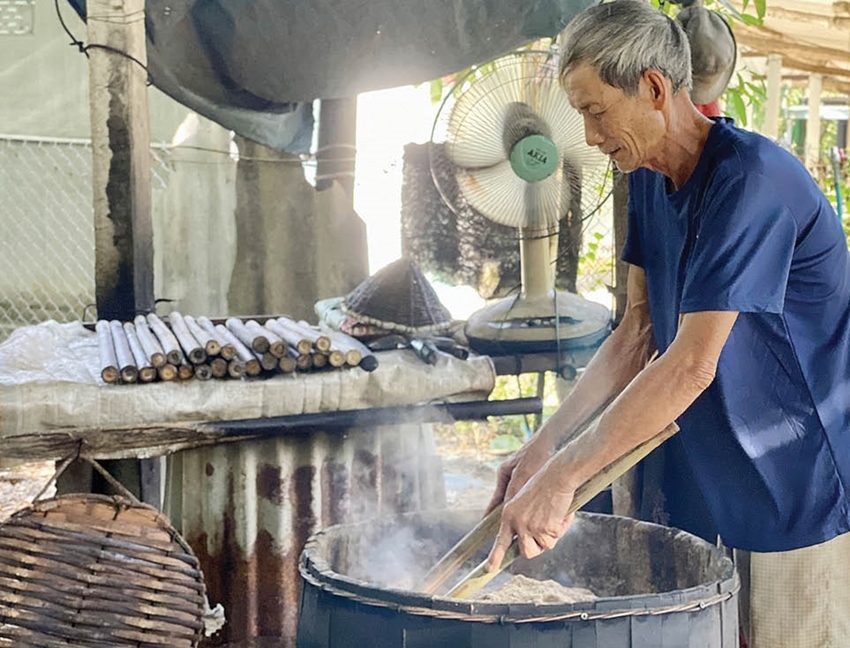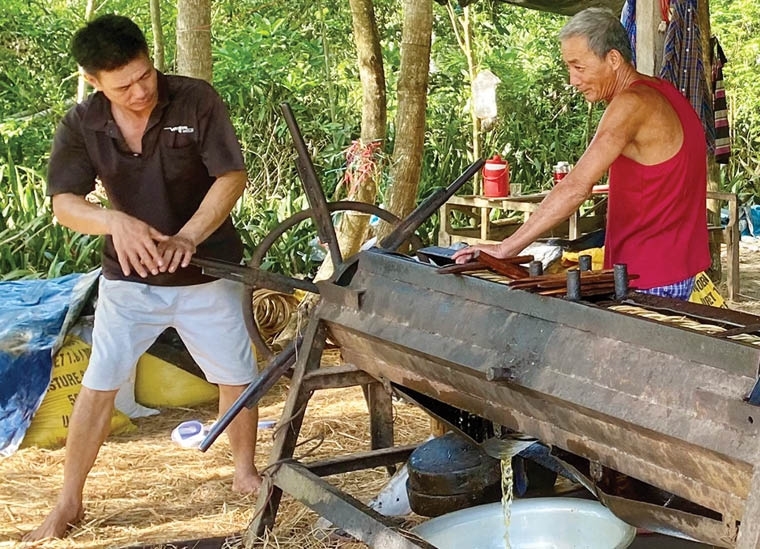 |
| Mr. Phong enduring the heat to dry the peanuts |
Ripe and fragrant
Though modestly nestled deep in a coastal village, the peanut oil press in My Loi (Vinh My, Phu Loc) is well-known to all residents of zone III (Phu Loc). Those working in the oil pressing industry are referred to as pressers for short, because their tool is a press more than 2 meters long. Annually, from June to July when the peanut harvest season is in full swing, the pressers are busier than ever.
Despite passing the age of 64, Mr. Huynh Tam is still as devoted as the first days of his career. His back has begun to bend, but his skillful hands are still proficient in oil pressing movements. He shared: “At that time, the “mechanism” of the oil press was not like it is now. The presser would make more effort, and the work was also much more difficult. Now, the pressing technology has improved a lot. Although still difficult, the oil loss rate is lower. In fact, I have been through many ups and downs in this profession for more than 40 years."
 |
| The manual oil press being more than 40 years old |
It takes a lot of effort to make cans of peanut oil. After being ground finely, the peanuts will be dried in a homemade pot. The cooked peanuts are made into blocks and then put into the press so that the oil is forced out of the residue.
The work of Mr. Tam and other pressers started at 3 a.m. Working tirelessly, they hardly have a specific eating time during the day. Taking advantage of the time when the peanuts are being dried, the pressers hurried to have a quick meal before rushing back to work.
Each drying pot usually contains more than 80kg of peanuts, and each drying session takes more than an hour. Responsible for drying and scooping the peanuts, Mr. Phong, another presser, must always be on duty to ensure the peanuts are cooked evenly. Outside the press, the summer sun is blistering; inside the press, the heat from burning poplar sticks bigger than your biceps is blazing. However, the on-site intense heat still has to give in to his perseverance and responsibility for his work.
Skillfully putting the peanuts into molds using a peanut measuring tool (a homemade cone-shaped tool made of sturdy twine), Mr. Phong said: “At first, I couldn’t bear standing by the pot. Nevetheless, I’ve gradually got used to it, so much so that when the peanut harvest season comes, I can’t stand not firing the pot to dry the peanuts or not smelling the fragrance of ripe peanuts.”
Gleamingly golden
After putting the peanut in the molds, the pressers tightly compress and bind them with two tightly woven bamboo rings. Cleverly placing the molds into the press and using bamboo sticks to fix it, Mr. Tam and other pressers used the power of their hands to rotate the shaft to squeeze the oil blocks together, forcing the oil to flow out.
 |
| Peanut oil being quickly poured into the can after being pressed |
On average, 15 - 20 liters of peanut oil will be produced in each pot. Already on standby, the owner of the peanut batches quickly scoop oil out of the container with their faces clearly shining with joy. Along with cans of gleaming yellow oil that looks like honey, these people also bring back oil blocks which are the residue of peanuts.
Nowadays, manual oil presses are increasingly rare. In addition to new oil pressing technology, many people can press their own oil at home with mini presses. However, the traditional press in this countryside is still chosen by many people.
“I choose the manual oil press not only because of the affordable price and good quality of oil, but also because this method incorporates peanut shells, from which there will be more byproducts, namely oil blocks. Here, the oil blocks are known as a nutritious and clean fertilizer, very suitable for growing vegetables on sandy soil,” said Ms. Nguyen Thi Mo, a customer.
Thanks to that, whenever the peanut season comes, the images of bright red flames from the peanut drying pot and the pressers covered in sweat emerge. Not only does the work create a decent income, the effort that the pressers put in also brings the joy of a bountiful harvest to farmers. Then the magical wheel of peanuts continues to rotate, from oil blocks to fertilizers to irrigate the flowering and fruit-bearing peanut patches on the barren sandy land.